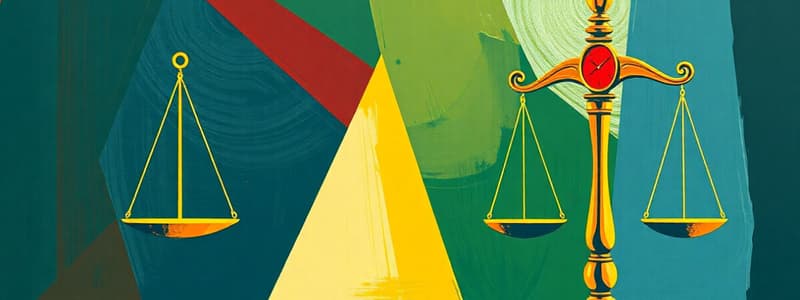Podcast
Questions and Answers
What is the primary focus of an economic perspective on law and policy?
What is the primary focus of an economic perspective on law and policy?
- How laws promote environmental protection
- How laws influence economic behavior (correct)
- How laws protect individual rights
- How laws create strong governance
Which type of law is concerned with maintaining order and deterring harmful behavior?
Which type of law is concerned with maintaining order and deterring harmful behavior?
- International Law
- Civil Law
- Administrative Law
- Criminal Law (correct)
What is the onus of proof in a civil case?
What is the onus of proof in a civil case?
- Preponderance of evidence (correct)
- Clear and convincing evidence
- Beyond a reasonable doubt
- Reasonable suspicion
Which of the following laws specifically governs relationships between countries?
Which of the following laws specifically governs relationships between countries?
Which type of law primarily resolves disputes between private individuals?
Which type of law primarily resolves disputes between private individuals?
What distinguishes regulatory law from criminal law?
What distinguishes regulatory law from criminal law?
Which of the following is NOT a purpose of constitutional law?
Which of the following is NOT a purpose of constitutional law?
Which body would typically address issues of discrimination in professional settings?
Which body would typically address issues of discrimination in professional settings?
Study Notes
Economic Perspective on Law and Policy
- Laws have a significant impact on economic behavior by shaping incentives.
- Laws can promote or hinder economic activity.
- Example: Strong property rights encourage investment and lead to economic growth.
Purpose of Different Laws
- Constitutional Law: Defines the government's structure and protects individual rights.
- Criminal Law: Deters and punishes harmful behavior, helping to maintain social order.
- Civil Law: Resolves disputes between individuals or entities, often involving compensation for harm.
- Administrative Law: Regulates government agencies and ensures that they act within their authorized powers.
- International Law: Governs relations between countries, including treaties and agreements.
- Environmental Law: Protects the environment, regulates pollution, and manages natural resources.
Specialized Boards and Tribunals
- Quasi-judicial bodies designed to resolve specific types of disputes.
- Their authority is derived from legislation.
- Examples:
- Administrative Tribunals: Handle disputes related to government decisions, such as immigration.
- Human Rights Commissions: Address complaints of discrimination.
- Professional Regulatory Bodies: Govern specific professions, for instance, medical boards.
Levels of Onus of Proof
- Criminal Cases: The prosecution must prove guilt "beyond a reasonable doubt."
- Civil Cases: The plaintiff must prove their case on the "balance of probabilities," meaning it is more likely than not.
- Regulatory/Quasi-Criminal Cases: Typically involve lower burdens of proof compared to criminal cases.
Types of Law
- Private Law: Governs relationships between individuals, including contracts and torts (civil wrongs).
- Public Law: Involves the government and individuals, such as constitutional law.
- Criminal Law: Deals with offenses against the state, often involving penalties like imprisonment.
- Quasi-criminal Law: Focuses on regulatory offenses, such as traffic violations.
- Regulatory Law: Encompasses rules and regulations created by government agencies to control specific activities, like environmental regulations.
Studying That Suits You
Use AI to generate personalized quizzes and flashcards to suit your learning preferences.
Related Documents
Description
Explore how laws influence economic behavior and activity. This quiz covers various types of laws including constitutional, criminal, civil, administrative, international, and environmental laws. Understand the role of specialized boards and tribunals in legal contexts.




